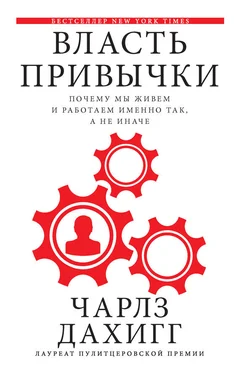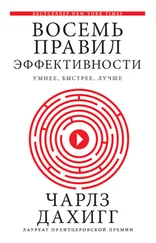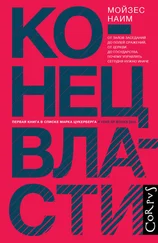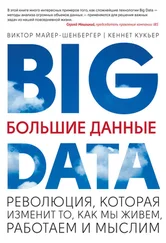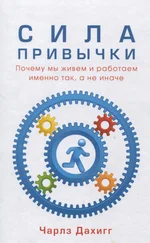Чарлз Дахигг - Власть привычки. Почему мы живем и работаем именно так, а не иначе
Здесь есть возможность читать онлайн «Чарлз Дахигг - Власть привычки. Почему мы живем и работаем именно так, а не иначе» — ознакомительный отрывок электронной книги совершенно бесплатно, а после прочтения отрывка купить полную версию. В некоторых случаях можно слушать аудио, скачать через торрент в формате fb2 и присутствует краткое содержание. ISBN: , Издательство: Литагент АСТ, Жанр: psy_theraphy, psy_generic, foreign_psychology, foreign_edu, Прочая научная литература, на русском языке. Описание произведения, (предисловие) а так же отзывы посетителей доступны на портале библиотеки ЛибКат.
- Название:Власть привычки. Почему мы живем и работаем именно так, а не иначе
- Автор:
- Издательство:Литагент АСТ
- Жанр:
- Год:неизвестен
- ISBN:978-5-17-098092-5
- Рейтинг книги:4.5 / 5. Голосов: 2
-
Избранное:Добавить в избранное
- Отзывы:
-
Ваша оценка:
- 100
- 1
- 2
- 3
- 4
- 5
Власть привычки. Почему мы живем и работаем именно так, а не иначе: краткое содержание, описание и аннотация
Предлагаем к чтению аннотацию, описание, краткое содержание или предисловие (зависит от того, что написал сам автор книги «Власть привычки. Почему мы живем и работаем именно так, а не иначе»). Если вы не нашли необходимую информацию о книге — напишите в комментариях, мы постараемся отыскать её.
Как «Starbucks» завоевывает своих клиентов?
Возможно ли запрограммировать себя на победу?
Влияют ли привычки одного человека на достижение общей цели?
Умело подкрепляя научную информацию интереснейшими примерами – историями из жизни крупных корпораций, успешных спортивных команд и даже движения за гражданские права, – Дахигг подводит нас к совершенно новому пониманию человеческой натуры и ее поистине неограниченного потенциала.
От силы привычки зависит все: занятия спортом и борьба с лишним весом, профессиональная эффективность и финансовый успех. Изменяя привычки, мы способны изменить и свою жизнь, и мир вокруг нас!
Власть привычки. Почему мы живем и работаем именно так, а не иначе — читать онлайн ознакомительный отрывок
Ниже представлен текст книги, разбитый по страницам. Система сохранения места последней прочитанной страницы, позволяет с удобством читать онлайн бесплатно книгу «Власть привычки. Почему мы живем и работаем именно так, а не иначе», без необходимости каждый раз заново искать на чём Вы остановились. Поставьте закладку, и сможете в любой момент перейти на страницу, на которой закончили чтение.
Интервал:
Закладка:
188
Обзор последующих исследований см.: M. C. Becker, “Organizational Routines: A Review of the Literature”, Industrial and Corporate Change 13 (2004): 643–78; Marta S. Feldman, “Organizational Routines as a Source of Continuous Change”, Organization Science 11 (2000): 611–29.
189
В ответ на заданные вопросы Уинтер писал: «Лично мой эмпирический вклад был крайне невелик, а в публикации и того меньше – в основном это были рассуждения Нельсона об аспектах технологических изменений. Что касается поведения фирм, в основном мы опирались на мнение гигантов Школы Карнеги (Simon, Cyert, March), а также множество других источников: технологические исследования, бизнес-примеры, экономику развития, мнения некоторых психологов… и Майкла Полани, кем бы вы его ни считали».
190
В ответ на заданные вопросы Уинтер уточнил, что модели, возникающие из независимых решений тысяч сотрудников, представляют собой один из аспектов привычных действий, однако форму этим привычным действиям, помимо прочего, «придает множество направлений, одним из которых является сознательный управленческий уклон. Мы подчеркнули, однако, что в этом случае реальное действие в противоположность более формальному, созданному намеренно, подвергается опять-таки влиянию множества решений на индивидуальном уровне» (см. книгу: Evolutionary Theory of Economic Change , с. 108).
191
Более подробную информацию о том, как появляются и работают организационные рутины, см.: Paul S. Adler, Barbara Goldoftas, & David I. Levine, “Flexibility Versus Efficiency? A Case Study of Model Changeovers in the Toyota Production System”, Organization Science 10 (1999): 43–67; B. E. Ashforth & Y. Fried, “The Mindlessness of Organisational Behaviors”, Human Relations 41 (1988): 305–29; Donde P. Ashmos, Dennis Duchon, & Reuben R. McDaniel, “Participation in Strategic Decision Making: The Role of Organisational Predisposition and Issue Interpretation”, Decision Sciences 29 (1998): 25–51; M. C. Becker, “The Influence of Positive and Negative Normative Feedback on the Development and Persistence of Group Routines”, Purdue University, 2001; M. C. Becker & N. Lazaric, “The Role of Routines in Organizations: An Empirical and Taxonomic Investigation”, Judge Institute of Management, University of Cambridge, 2004; Bessant, Caffyn, & Gallagher, “The Influence of Knowledge in the Replication of Routines”, Economie Appliquée LVI, 65–94; “An Evolutionary Model of Continuous Improvement Behaviour”, Technovation 21 (2001): 67–77; Tilmann Betsch, Klaus Fiedler, & Julia Brinkmann, “Behavioral Routines in Decision Making: The Effects of Novelty in Task Presentation and Time Pressure on Routine Maintenance and Deviation”, European Journal of Psychology 28 (1998): 861–78; Tilmann Betsch et al., “When Prior Knowledge Overrules New Evidence: Adaptive Use of Decision Strategies and Role Behavioral Routines”, Swiss Journal of Psychology 58 (1999): 151–60; Tilmann Betsch et al., “The Effects of Routine Strength on Adaptation and Information Search in Recurrent Decision Making”, Organisational Behaviour and Human Decision Processes 84 (2001): 23–53; J. Burns, “The Dynamics of Accounting Change: Interplay Between New Practices, Routines, Institutions, Power, and Politics”, Accounting, Auditing and Accountability Journal 13 (2000): 566–86; M. D. Cohen, “Individual Learning and Organisational Routine: Emerging Connections”, Organisation Science 2 (1991): 135–39; M. Cohen & P. Bacdayan, “Organisational Routines Are Stored as Procedural Memory: Evidence from a Laboratory Study”, Organisation Science 5 (1994): 554–68; M. D. Cohen et al., “Routines and Other Recurring Action Patterns of Organisations: Contemporary Research Issues”, Industrial and Corporate Change 5 (1996): 653–98; B. Coriat, “Variety, Routines, and Networks: The Metamorphosis of Fordist Firms”, Industrial and Corporate Change 4 (1995): 205–27; B. Coriat & G. Dosi, “Learning How to Govern and Learning How to Solve Problems: On the Co-evolution of Competences, Conflicts, and Organisational Routines”, The Role of Technology, Strategy, Organisation, and Regions , ed. A. D. J. Chandler, P. Hadstroem, & O. Soelvell (Oxford: Oxford University Press, 1998); L. D’Adderio, “Configuring Software, Reconfiguring Memories: The Influence of Integrated Systems on the Reproduction of Knowledge and Routines”, Industrial and Corporate Change 12 (2003): 321–50; P. A. David, Path Dependence and the Quest for Historical Economics: One More Chorus of the Ballad of QWERTY (Oxford: Oxford University Press, 1997); G. Delmestri, “Do All Roads Lead to Rome. or Berlin? The Evolution of Intra– and Inter-organisational Routines in the Machine-Building Industry”, Organisation Studies 19 (1998): 639–65; Giovanni Dosi, Richard R. Nelson, & Sidney Winter, “Introduction: The Nature and Dynamics of Organisational Capabilities”, The Nature and Dynamics of Organisational Capabilities , ed. G. Dosi, R. R. Nelson, & S. G. Winter (Oxford: Oxford University Press, 2000), 1–22; G. Dowell & A. Swaminathan, “Racing and Backpedalling into the Future: New Product Introduction and Organisational Mortality in the US Bicycle Industry, 1880–1918”, Organisation Studies 21 (2000): 405–31; A. C. Edmondson, R. M. Bohmer, & G. P. Pisano, “Disrupted Routines: Team Learning and New Technology Implementation in Hospitals”, Administrative Science Quarterly 46 (2001): 685–716; M. Egidi, “Routines, Hierarchies of Problems, Procedural Behaviour: Some Evidence from Experiments”, The Rational Foundations of Economic Behaviour , ed. K. Arrow et al. (London: Macmillan, 1996), 303–33; M. S. Feldman, “Organisational Routines as a Source of Continuous Change”, Organisation Science 11 (2000): 611–29; Marta S. Feldman, “A Performative Perspective on Stability and Change in Organizational Routines”, Industrial and Corporate Change 12 (2003): 727–52; Marta S. Feldman & B. T. Pentland, “Reconceptualizing Organizational Routines as a Source of Flexibility and Change”, Administrative Science Quarterly 48 (2003): 94–118; Marta S. Feldman & A. Rafaeli, “Organisational Routines as Sources of Connections and Understandings”, Journal of Management Studies 39 (2002): 309–31; A. Garapin & A. Hollard, “Routines and Incentives in Group Tasks”, Journal of Evolutionary Economics 9 (1999): 465–86; C. J. Gersick & J. R. Hackman, “Habitual Routines in Task-Performing Groups”, Organisational Behaviour and Human Decision Processes 47 (1990): 65–97; R. Grant, “Toward a Knowledge-Based Theory of the Firm”, Strategic Management Journal 17(1996): 109–22; R. Heiner, “The Origin of Predictable Behaviour”, American Economic Review 73 (1983): 560–95; G. M. Hodgson, “The Ubiquity of Habits and Rules”, Cambridge Journal of Economics 21 (1997): 663–84; G. M. Hodgson, “The Mystery of the Routine: The Darwinian Destiny of An Evolutionary Theory of Economic Change ”, Revue Économique 54 (2003): 355–84; G. M. Hodgson & T. Knudsen, “The Firm as an Interactor: Firms as Vehicles for Habits and Routines”, Journal of Evolutionary Economics 14, № 3 (2004): 281–307; A. Inam, “Institutions, Routines, and Crises: Post-earthquake Housing Recovery in Mexico City and Los Angeles”, University of Southern California, 1997; A. Inam, “Institutions, Routines, and Crises – Post-earthquake Housing Recovery in Mexico City and Los Angeles”, Cities 16 (1999): 391–407; O. Jones & M. Craven, “Beyond the Routine: Innovation Management and the Teaching Company Scheme”, Technovation 21 (2001): 267–79; M. Kilduff, “Performance and Interaction Routines in Multinational Corporations”, Journal of International Business Studies 23 (1992): 133–45; N. Lazaric, “The Role of Routines, Rules, and Habits in Collective Learning: Some Epistemological and Ontological Considerations”, European Journal of Economic and Social Systems 14 (2000): 157–71; N. Lazaric & B. Denis, “How and Why Routines Change: Some Lessons from the Articulation of Knowledge with ISO 9002 Implementation in the Food Industry”, Economies et Sociétés 6 (2001): 585–612; Levitt & J. March, “Organisational Learning”, Annual Review of Sociology 14 (1988): 319–40; P. Lillrank, “The Quality of Standard, Routine, and Nonroutine Processes”, Organization Studies 24 (2003): 215–33; S. Massini et al., “The Evolution of Organizational Routines Among Large Western and Japanese Firms”, Research Policy 31 (2002): 1333–48; T. J. McKeown, “Plans and Routines, Bureaucratic Bargaining, and the Cuban Missile Crisis”, Journal of Politics 63 (2001): 1163–90; A. P. Minkler, “The Problem with Dispersed Knowledge: Firms in Theory and Practice”, Kyklos 46 (1993): 569–87; P. Morosini, S. Shane, & H. Singh, “National Cultural Distance and Cross-Border Acquisition Performance”, Journal of International Business Studies 29 (1998): 137–58; A. Narduzzo, E. Rocco, & M. Warglien, “Talking About Routines in the Field”, The Nature and Dynamics of Organizational Capabilities , ed. G. Dosi, R. Nelson, & S. Winter (Oxford: Oxford University Press, 2000), 27–50; R. R. Nelson, “Routines”, The Elgar Companion to Institutional and Evolutionary Economics, vol. 2, ed. G. Hodgson, W. Samuels, & M. Tool (Aldershot, U.K.: Edward Elgar, 1992), 249–53; B. T. Pentland, “Conceptualizing and Measuring Variety in the Execution of Organizational Work Processes”, Management Science 49 (2003): 857–70; B. T. Pentland & H. Rueter, “Organisational Routines as Grammars of Action”, Administrative Sciences Quarterly 39 (1994): 484–510; L. Perren & P. Grant, “The Evolution of Management Accounting Routines in Small Businesses: A Social Construction Perspective”, Management Accounting Research 11 (2000): 391–411; D. J. Phillips, “A Genealogical Approach to Organizational Life Chances: The Parent– Progeny Transfer Among Silicon Valley Law Firms, 1946–1996”, Administrative Science Quarterly 47 (2002): 474–506; S. Postrel & R. Rumelt, “Incentives, Routines, and Self-Command”, Industrial and Corporate Change 1 (1992): 397–425; P. D. Sherer, N. Rogovksy, & N. Wright, “What Drives Employment Relations in Taxicab Organisations?” Organisation Science 9 (1998): 34–48; H. A. Simon, “Programs as Factors of Production”, Proceedings of the Nineteenth Annual Winter Meeting, 1966, Industrial Relations Research Association, 1967, 178–88; L. A. Suchman, “Office Procedure as Practical Action: Models of Work and System Design”, ACM Transactions on Office Information Systems 1 (1983): 320–28; G. Szulanski, “Appropriability and the Challenge of Scope: Banc One Routinizes Replication”, Nature and Dynamics of Organisational Capabilities , ed. G. Dosi, R. R. Nelson, & S. G. Winter (Oxford: Oxford University Press, 1999), 69–97; D. Tranfield & S. Smith, “The Strategic Regeneration of Manufacturing by Changing Routines”, International Journal of Operations and Production Management 18 (1998): 114–29; Karl E. Weick, “The Vulnerable System: An Analysis of the Tenerife Air Disaster”, Journal of Management 16 (1990): 571–93; Karl E. Weick, “The Collapse of Sensemaking in Organizations: The Mann – Gulch Disaster”, Administrative Science Quarterly 38 (1993): 628–52; H. M. Weiss & D. R. Ilgen, “Routinized Behaviour in Organisations”, Journal of Behavioral Economics 14 (1985): 57–67; S. G. Winter, “Economic ‘Natural Selection’ and the Theory of the Firm”, Yale Economic Essays 4 (1964): 225–72; S. G. Winter, “Optimization and Evolution in the Theory of the Firm”, Adaptive Economic Models , ed. R. Day & T. Groves (New York: Academic Press, 1975), 73–118; S. G. Winter & G. Szulanski, “Replication as Strategy”, Organization Science 12 (2001): 730–43; S. G. Winter & G. Szulanski, “Replication of Organisational Routines: Conceptualizing the Exploitation of Knowledge Assets”, The Strategic Management of Intellectual Capital and Organisational Knowledge: A Collection of Readings , ed. N. Bontis & C. W. Choo (New York: Oxford University Press, 2001), 207–21; M. Zollo, J. Reuer, & H. Singh, “Interorganizational Routines and Performance in Strategic Alliances”, Organization Science 13 (2002): 701–13.
Читать дальшеИнтервал:
Закладка:
Похожие книги на «Власть привычки. Почему мы живем и работаем именно так, а не иначе»
Представляем Вашему вниманию похожие книги на «Власть привычки. Почему мы живем и работаем именно так, а не иначе» списком для выбора. Мы отобрали схожую по названию и смыслу литературу в надежде предоставить читателям больше вариантов отыскать новые, интересные, ещё непрочитанные произведения.
Обсуждение, отзывы о книге «Власть привычки. Почему мы живем и работаем именно так, а не иначе» и просто собственные мнения читателей. Оставьте ваши комментарии, напишите, что Вы думаете о произведении, его смысле или главных героях. Укажите что конкретно понравилось, а что нет, и почему Вы так считаете.
